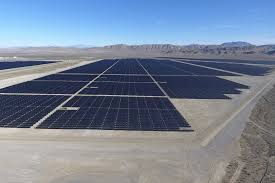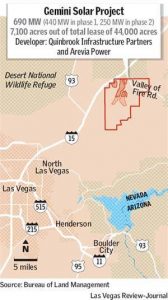
While President Trump has been critical of wind and solar projects, his administration is set to approve what would be the largest solar farm in the U.S.
It will be a 690 MW operation with 380 MW of 4-hour battery storage.
NV Energy’s Gemini solar-plus-storage project will cost around $38.44 per megawatt-hour under a 25-year contract and will take up approximately 7,100 acres of federal land, according to the utility. The project would mark the third time the Trump administration has approved solar siting on federal lands.
In June 2018, BLM approved an 80 MW project in Wyoming and in November 2018, the bureau approved a 550 MW farm outside Joshua Tree National Park according to Utility Dive.

“The proposed Gemini Solar Project would represent a significant increase in renewable energy capacity for Nevada and the West,” BLM Southern Nevada District Manager Tim Smith said in a statement announcing the bureau’s draft environmental review. “The BLM actively supports the Department of the Interior’s America First Energy Plan, an ‘all of the above’ strategy which supports energy development on public lands.”
Conservation groups, including Basin and Range Watch, Defenders of Wildlife and the Wilderness Society cited concerns that the project may have “unavoidable impacts” to “sensitive resources” in public comments and blogs.
The Gemini project, if given final approval by BLM, would surpass a 579 MW solar farm in southern California that currently holds the record for the largest solar array in the United States.
Quinbrook Infrastructure Partners and Arevia Power are heading development of the project.
Nevada’s December approval of NV Energy’s integrated resource plan included 1,190 MW of solar and storage. In addition to the Gemini project, regulators approved a 200 MW solar with 75 MW battery with five hour duration storage project and a 300 MW solar with 135 MW of 4 hour battery storage facility. All three projects are expected to begin operation by Jan. 1, 2024.
BLM first opened up public comment on the Gemini project’s draft environmental impact plan in June and will close its final comment period Jan. 27.
Source: Utility Dive





